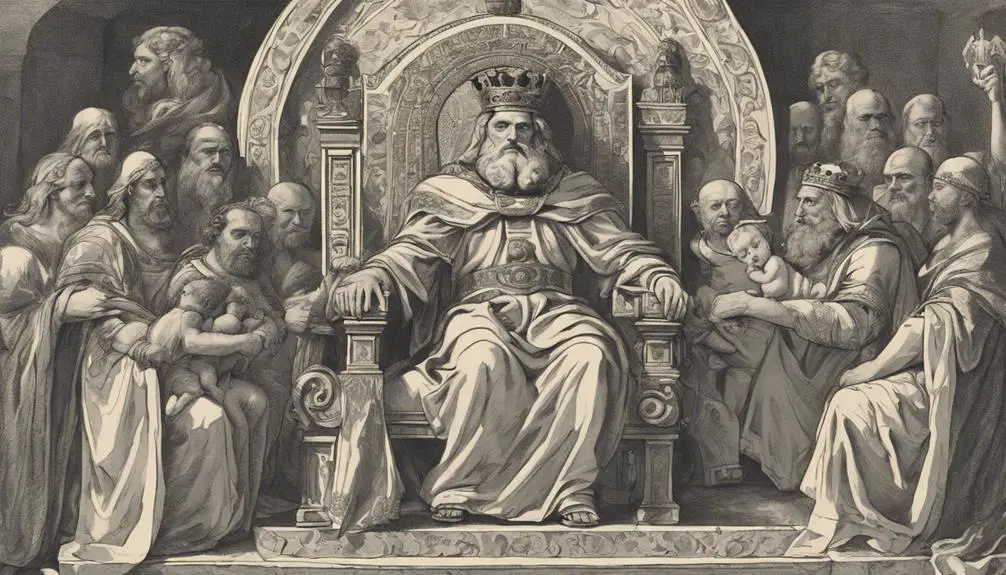Survey the dramatic contrasts between virtuous and villainous monarchs in the Bible, uncovering lessons that…

List of Good and Bad Kings in the Bible
Have you ever pondered if the moral compass of a leader truly shapes a nation's destiny?
The Bible presents a fascinating spectrum of kings whose virtues and vices paint a vivid tableau of leadership's impact.
From Solomon's unparalleled wisdom to Ahab's idolatrous downfall, each story offers a unique lens through which to examine the intricate interplay between personal character and national trajectory.
As you explore the narratives of David's heartfelt devotion and Hezekiah's steadfast faith, alongside Saul's tragic fall, you're invited to consider how these ancient lessons might illuminate today's discussions on leadership and morality.
What insights will you uncover that resonate with our modern world?
Key Takeaways
- Good kings, like Solomon and Hezekiah, prioritized wisdom, prosperity, and faithfulness to Yahweh.
- Bad kings, such as Saul and Ahab, suffered downfall due to disobedience, idolatry, and moral decline.
- Devout kings like David showed the importance of repentance, humility, and dedication to worship.
- Kings' legacies in the Bible reflect their relationship with faith, leadership qualities, and the consequences of their actions.
The Wisdom of Solomon

Solomon's wisdom, renowned throughout ancient texts, significantly shaped his reign and established him as a paragon of judicial prudence and enlightened governance in biblical history. His sagacity, not just in matters of justice but also in administration and diplomacy, positioned him uniquely among the monarchs of the ancient Near East.
Central to understanding his wise rule is considering Solomon's wealth, which wasn't merely a sign of prosperity but a tool for securing his kingdom's stability and fostering alliances with neighboring states. This affluence enabled ambitious projects, most notably the construction of the Temple in Jerusalem, a monumental endeavor that not only showcased his wealth and architectural vision but also aimed to centralize religious worship in his kingdom.
The construction of the Temple, under his directive, was a testament to Solomon's dedication to fostering a unified spiritual identity among his people, further solidifying his reputation for wisdom and foresight. Through these actions, Solomon's reign is depicted as a golden era of peace, prosperity, and spiritual fervor, underscoring the indelible mark his wise leadership left on biblical and historical narratives.
David's Heart for God
David's unwavering dedication to God set the foundation for his reign, distinguishing him as a king whose spiritual devotion profoundly influenced his leadership and legacy. His heart for God wasn't just evident in his victories and decisions but also in his humility and willingness to repent. This complex relationship between David and the divine is a cornerstone of his narrative, offering valuable insights into the nature of biblical kingship.
Consider these aspects of David's spiritual journey:
- David's repentance: After his transgressions, David's immediate turn to God for forgiveness underscores his recognition of divine sovereignty. His psalms often reflect a heart deeply contrite and wholly reliant on God's mercy.
- Goliath battle: This event symbolizes David's faith in God's power over human might. His victory, armed with little more than faith and a sling, exemplifies his reliance on God's strength.
- Worship and Praise: David's establishment of worship in Jerusalem, including the transport of the Ark of the Covenant, highlights his desire to center his kingdom around worship of God.
- Legislative Actions: His efforts to organize religious practices and his plans for the temple (later built by Solomon) reflect his commitment to institutionalizing worship.
David's story teaches that a heart aligned with God's can lead to profound leadership, marked by both successes and the humility to seek forgiveness.
The Downfall of Saul

Grasping for power and losing sight of divine guidance, Saul's reign illustrates a tragic departure from the faith-driven leadership exemplified by his predecessor. Initially anointed by God, Saul's tenure as king is marred by his escalating disobedience and failure to adhere to divine commands. This rebellion against spiritual directives sets the stage for his ultimate downfall, highlighting a key theme in biblical narratives: the peril of forsaking divine will.
Saul's jealousy of David, who was favored by God for his unwavering faith, further accelerates Saul's descent. Consumed by envy, Saul's attempts to kill David not only fail but also estrange him from God's favor, illustrating the destructive nature of jealousy and the importance of humility in leadership. Saul's paranoia and obsession with maintaining power lead him to seek counsel from the Witch of Endor, an act that directly contravenes God's prohibition against necromancy. This decision encapsulates Saul's complete departure from faith, as he turns to forbidden practices in a desperate bid to retain his kingship.
Through Saul's story, one discerns the vital lesson that power, when divorced from ethical and spiritual principles, inevitably leads to ruin. Saul's narrative serves as a cautionary tale about the consequences of prioritizing personal ambition over divine guidance.
Ahab's Idolatrous Reign
Ahab's reign, marked by rampant idolatry, stands as a stark testament to the dangers of deviating from monotheistic worship in ancient Israelite society. Under his rule, the Northern Kingdom of Israel witnessed a significant departure from the worship of Yahweh, largely influenced by his marriage to Jezebel. This Phoenician princess brought with her a fervent dedication to Baal, a Canaanite deity, which she imposed on the Israelites with Ahab's support.
- Jezebel's Influence: Her strong advocacy for Baal worship led to the construction of altars and temples dedicated to this deity, fundamentally altering the religious landscape of Israel.
- Naboth's Vineyard: This incident highlights Ahab's moral decline and Jezebel's ruthless tactics. Naboth's refusal to sell his vineyard to Ahab, due to its ancestral significance, resulted in Jezebel orchestrating Naboth's unjust execution.
- Prophets of Baal: Ahab allowed Jezebel to persecute prophets of Yahweh, showcasing a stark intolerance for the monotheistic faith of Israel.
- Divine Retribution: Biblical accounts attribute the downfall of Ahab's dynasty to his and Jezebel's idolatrous practices, emphasizing the consequences of abandoning Yahweh.
This phase of Israel's history under Ahab serves as a cautionary tale about the perils of idolatry and the erosion of religious and ethical values.
Hezekiah's Faithful Leadership

In stark contrast to Ahab's idolatrous reign, King Hezekiah's leadership embodies a return to devout worship and adherence to Yahweh's commandments, setting a precedent for faithfulness in the midst of prevailing pagan influences. Hezekiah's reforms were comprehensive, targeting the eradication of idol worship and the restoration of the Temple in Jerusalem. He removed high places, smashed sacred stones, and cut down Asherah poles, demonstrating his commitment to purifying worship practices and centralizing religious rites in Jerusalem. These actions not only reaffirmed the exclusivity of Yahweh worship but also reestablished social and religious order.
Amidst Hezekiah's spiritual revival, the Assyrian siege of Jerusalem tested his leadership. This event showcased not only his strategic acumen in defending the city but also his unwavering faith in Yahweh. Hezekiah's response to the crisis—seeking prophetic counsel and praying for deliverance—highlights his reliance on divine guidance over military might. The subsequent miraculous deliverance of Jerusalem from the Assyrians reinforced the notion that faithfulness to Yahweh brings protection and victory, further legitimizing Hezekiah's reforms and leadership in the eyes of his people and posterity.
Frequently Asked Questions
How Did the Economic Policies of the Kings Impact the Daily Lives of the Common People in Their Kingdoms?
The economic policies of kings deeply impacted commoners' lives through agricultural productivity and trade expansion. When kings invested in agriculture, you'd see a boost in food supply, directly benefiting your daily sustenance.
If they focused on expanding trade, you'd experience a more vibrant market, offering you diverse goods and possibly better job opportunities. However, neglect in these areas could lead to scarcity, stifling your family's well-being and economic security.
Did Any of the Kings Have Significant Interactions or Alliances With Non-Israelite Rulers, and How Did These Relationships Affect Their Reigns?
Yes, several kings formed significant interactions or alliances with non-Israelite rulers. These relationships often pivoted around trade routes and military alliances, profoundly influencing their reigns.
For instance, they'd secure trade routes to enhance their kingdom's economy or form military alliances to bolster their defense against common enemies. Such interactions could also impact the king's popularity, either positively, by bringing prosperity, or negatively, if perceived as compromising on religious or cultural values.
How Did the Various Kings' Reigns Influence the Architectural and Cultural Development Within Their Territories?
You're diving into a time machine, zooming back to witness firsthand how kings' reigns sculpted the architectural landscape and cultural ethos of their domains.
Their strategic decisions often led to the construction of grand religious buildings, leaving an indelible artistic legacy. Through these edifices, they not only showcased their divine favor and political power but also significantly influenced the cultural development, embedding their ideologies and aesthetic preferences into the very fabric of society.
Were There Any Notable Legal Reforms or Changes in the Justice System Introduced by These Kings, and How Were They Received by Their Subjects?
Certainly, several kings initiated legal reforms and altered the justice system, setting new legal precedents and making pivotal judicial appointments. These changes, often revolutionary, were aimed at strengthening governance and ensuring fairness.
However, their reception varied widely among subjects. While some reforms were welcomed for promoting justice and order, others were met with resistance, perceived as consolidating royal power or favoring certain groups over others, sparking significant debate and, at times, unrest.
How Did the Succession of Good and Bad Kings Affect the Overall Spiritual and Moral Direction of the Israelite Nation Over Time?
Imagine a pendulum swinging, representing the Israelite nation's spiritual journey.
The succession of good and bad kings significantly impacted this journey, with religious reforms and prophetic interactions shaping the moral compass.
Good kings implemented reforms that aligned with divine mandates, fostering a positive spiritual direction. Conversely, bad kings led to moral decay, often ignoring prophetic warnings.
This oscillation between adherence and disregard for divine guidance profoundly influenced the nation's spiritual and moral trajectory over time.
Conclusion
So, you've journeyed through the biblical rollercoaster of monarchs, from the sage-like wisdom of Solomon to the idol-worshipping escapades of Ahab.
It's almost as if selecting a king was a divine game of roulette, where virtues and vices were doled out with celestial whimsy. Analyzing these kings teaches us that divine favor is as unpredictable as a soap opera plot twist.
Remember, in the grand biblical narrative, every king's reign is a lesson — sometimes in how not to rule a kingdom.



Sign up